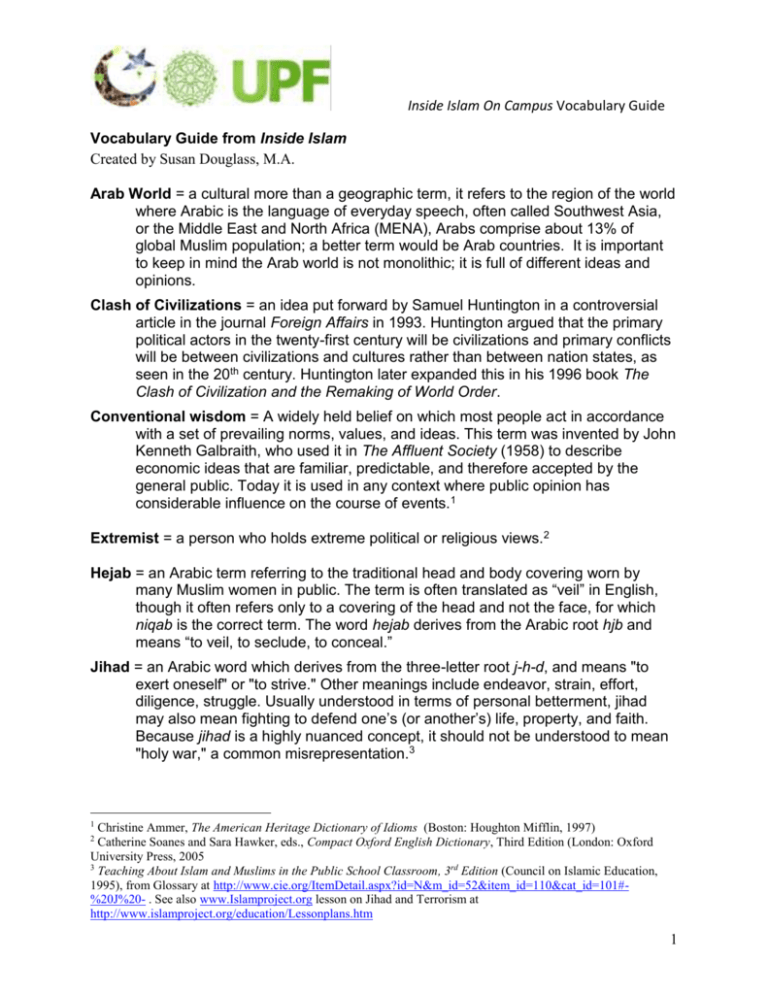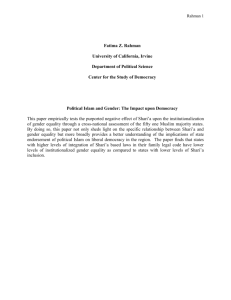Vocabulary Guide from Inside Islam
advertisement

Inside Islam On Campus Vocabulary Guide Vocabulary Guide from Inside Islam Created by Susan Douglass, M.A. Arab World = a cultural more than a geographic term, it refers to the region of the world where Arabic is the language of everyday speech, often called Southwest Asia, or the Middle East and North Africa (MENA), Arabs comprise about 13% of global Muslim population; a better term would be Arab countries. It is important to keep in mind the Arab world is not monolithic; it is full of different ideas and opinions. Clash of Civilizations = an idea put forward by Samuel Huntington in a controversial article in the journal Foreign Affairs in 1993. Huntington argued that the primary political actors in the twenty-first century will be civilizations and primary conflicts will be between civilizations and cultures rather than between nation states, as seen in the 20th century. Huntington later expanded this in his 1996 book The Clash of Civilization and the Remaking of World Order. Conventional wisdom = A widely held belief on which most people act in accordance with a set of prevailing norms, values, and ideas. This term was invented by John Kenneth Galbraith, who used it in The Affluent Society (1958) to describe economic ideas that are familiar, predictable, and therefore accepted by the general public. Today it is used in any context where public opinion has considerable influence on the course of events.1 Extremist = a person who holds extreme political or religious views.2 Hejab = an Arabic term referring to the traditional head and body covering worn by many Muslim women in public. The term is often translated as “veil” in English, though it often refers only to a covering of the head and not the face, for which niqab is the correct term. The word hejab derives from the Arabic root hjb and means “to veil, to seclude, to conceal.” Jihad = an Arabic word which derives from the three-letter root j-h-d, and means "to exert oneself" or "to strive." Other meanings include endeavor, strain, effort, diligence, struggle. Usually understood in terms of personal betterment, jihad may also mean fighting to defend one’s (or another’s) life, property, and faith. Because jihad is a highly nuanced concept, it should not be understood to mean "holy war," a common misrepresentation.3 1 Christine Ammer, The American Heritage Dictionary of Idioms (Boston: Houghton Mifflin, 1997) Catherine Soanes and Sara Hawker, eds., Compact Oxford English Dictionary, Third Edition (London: Oxford University Press, 2005 3 Teaching About Islam and Muslims in the Public School Classroom, 3rd Edition (Council on Islamic Education, 1995), from Glossary at http://www.cie.org/ItemDetail.aspx?id=N&m_id=52&item_id=110&cat_id=101#%20J%20- . See also www.Islamproject.org lesson on Jihad and Terrorism at http://www.islamproject.org/education/Lessonplans.htm 2 1 Inside Islam On Campus Vocabulary Guide Muslim World = a cultural more than a geographic term, it refers to the region of the world where countries with majority Muslim populations are located; it is often confused with the Middle East, although about half of global Muslim population is located in Asia Polling = recording the opinion or vote of a number of people. Professional pollsters conduct polls by recording the opinions of samples of various populations in response to designed questionnaires. People in a sample are interviewed or reply to a questionnaire. The questions asked usually have a list of possible responses, and the responses are analyzed. The results are usually given as percentages of those expressing an opinion on the particular question. Radical = a person who supports complete political or social reform; radicalize (verb) to become, or cause someone to become an advocate of complete political or social reform.4 Shari’ah (law) = Shari’ah [sha-ree-ah] literally means "the path," this term refers to guidance from God to be used by Muslims to regulate their societal and personal affairs. The Shari’ah is based upon the Qur’an and the Sunnah (behaviors) of Muhammad, and is interpreted by scholars in deliberating and deciding upon questions and issues of a legal nature.5 The book What Everyone Needs to Know about Islam defines shari’ah in this way: “The purpose of Islamic law is to provide the guidelines and requirements for two types of interactions: those between human beings and God, or worship, and those between human beings, or social transactions. Both have private and public dimensions, and both give Islam a prominent public role in Muslim community life.”6 In the film Inside Islam, Rami Khouri states, “Shari'ah law is simply the rule of law defined in an Islamic context, drawing on Qur’anic Islamic values just as in the United states they have the Ten Commandments and the Bible as the core of American moral values.” Dalia Mogahed: “A set of inalienable rights that people inherit from their Creator, so what people think of when they hear the word Shari’ah are protections that God guarantees this human dignity for each individual through these principles that no government is allowed to take away. Scholars will then derive Islamic law form these principles.” John Esposito states: “…that which we call Islamic law is a combination between the divine and human, growing out of a social and historical context.”7 Statistical outlier = In statistics, an outlier is an observation that is numerically distant from the rest of the data, an observation that appears to deviate markedly from other members of the sample in which it occurs.8 Featured under “Data” in the film Inside Islam, Gallup polling revealed that unequivocal supporters of the 9/11 4 Catherine Soanes and Sara Hawker, eds., Compact Oxford English Dictionary, Third Edition (London: Oxford University Press, 2005 5 Teaching About Islam and Muslims in the Public School Classroom, 3 rd Edition (Council on Islamic Education, 1995), from Glossary at http://www.cie.org/ItemDetail.aspx?id=N&m_id=52&item_id=110&cat_id=101#%20S%206 John L. Esposito, What Everyone Needs to Know About Islam (Oxford University Press, 2002), p. 139. 7 See also www.Islamproject.org lessons on Shari’ah law at http://www.islamproject.org/education/Lessonplans.htm 8 Barnett, V. and Lewis, T.: 1994, Outliers in Statistical Data. John Wiley & Sons., 3 rd edition. 2 Inside Islam On Campus Vocabulary Guide attacks on the United States were characterized by responses to other questions in the data set that differed markedly from the majority opinions. Stereotype = (noun) a widely held but oversimplified idea of the typical characteristics of a person or thing; (verb) to represent someone or something as a stereotype9 Terrorism = unofficial or unauthorized use of violence and intimidation in the attempt to achieve political aims10 (for a discussion of international law based on numerous legal and official definitions, see http://en.wikipedia.org/wiki/Definition_of_terrorism#In_international_law ) 9 Catherine Soanes and Sara Hawker, eds., Compact Oxford English Dictionary, Third Edition (London: Oxford University Press, 2005 10 Catherine Soanes and Sara Hawker, eds., Compact Oxford English Dictionary, Third Edition (London: Oxford University Press, 2005. See also www.Islamproject.org lesson defining jihad and terrorism and distinguishing the two at http://www.islamproject.org/education/Lessonplans.htm 3










